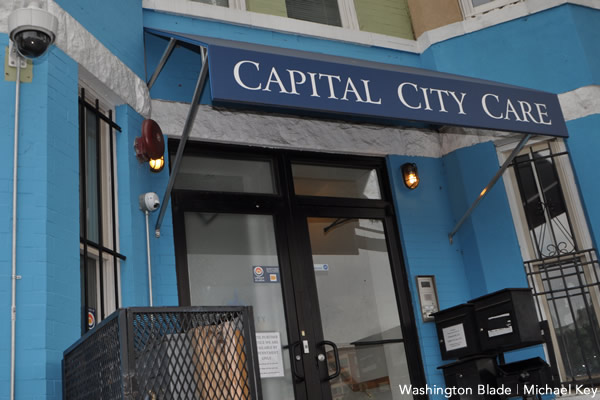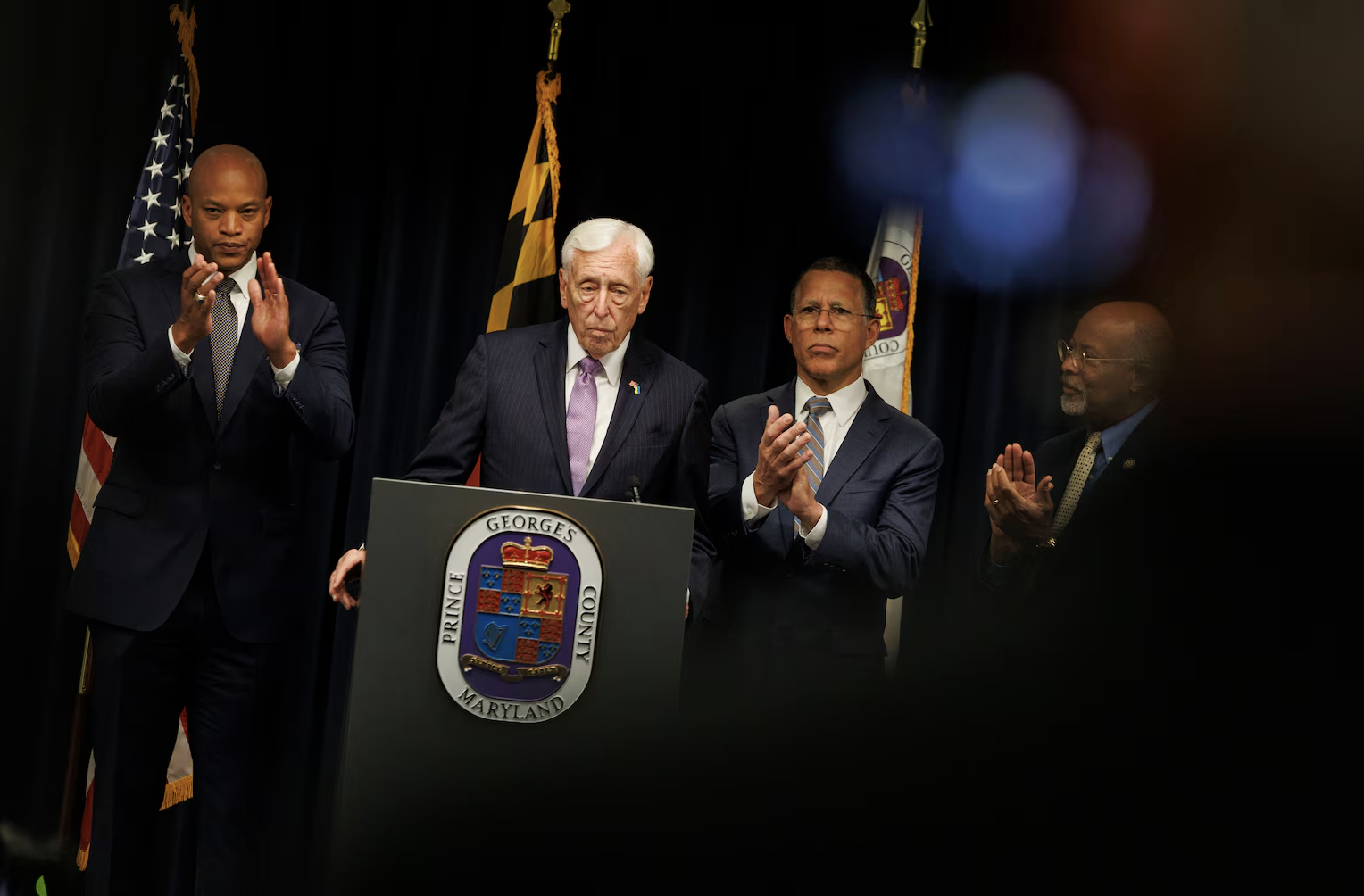Local
First D.C. medical marijuana dispensaries open
AIDS activists hail development; cautious reaction from federal prosecutor


Capital City Care sold its first doctor-approved dose of medical marijuana to an HIV-positive man on July 29. (Washington Blade photo by Michael Key)
Advocates for people with AIDS and other serious illnesses breathed a sigh of relief three weeks ago when the first of three dispensaries approved by the D.C. Department of Health to sell medical marijuana opened its doors about a mile north of the U.S. Capitol.
Capital City Care, located in a converted townhouse at 1334 North Capitol St., N.W., sold its first doctor-approved dose of high-grade cannabis to an HIV-positive man on July 29, 15 years after D.C. voters approved a 1998 ballot initiative to legalize medical marijuana in the nation’s capital.
Medical marijuana advocates in D.C. said initial concerns that dispensaries could only accept payments in cash for a typical purchase of $250 or more and that the dispensaries would be located in unsafe neighborhoods, subjecting buyers to potential muggings, were largely unfounded.
Although the cultivation centers where the marijuana will be grown are in remote warehouse sections of Northeast D.C., most of the dispensaries are expected to open in safe neighborhoods, according to Ben Young, chief of staff for D.C. Council member David Catania (I-At-Large), who wrote the implementing legislation for the medical marijuana law.
One of the other two dispensaries that have so far been approved for a license, Takoma Park Wellness Center, recently opened in the city’s Takoma Park neighborhood at 6925 Blair Rd., N.W. The other one, Metropolitan Wellness Center, just opened near the Eastern Market Metro station on Capitol Hill at 409 8th St., S.E.
And officials with Capital City Care say they will soon provide a shuttle service to drive patients to and from central locations downtown or to a nearby Metro station. The officials also note that payment for marijuana supplies can be made by bank debit cards, although banks won’t allow patients to pay by credit card or check.
D.C.’s medical marijuana law encountered the first in a series of roadblocks shortly after the 1998 ballot measure passed with nearly 70 percent of the votes cast when Congress intervened by preventing the law from being implemented for more than a decade. When Congress finally lifted its hold on the law in 2009, the City Council and D.C. Department of Health began a laborious process of developing strict rules and procedures for licensing and approving cultivation centers and the dispensaries.
“It’s really gratifying that this 15-year journey has moved to where we are now,” said D.C. attorney Wayne Turner, who, in his role as a gay rights and AIDS activist, was among the leaders of the campaign in support of the 1998 ballot initiative.
“We still have Congress looming over our head,” he said. “And we have an administration that is not that supportive.”

(Photo courtesy of Capital City Care)
With that as a backdrop, both AIDS activists and D.C. government officials have said the additional four years it has taken to get the medical marijuana program up and running appears to have helped the city avoid some of the pitfalls encountered by medical marijuana programs in other states, such as California and Colorado.
Among the problems encountered by states that legalized medical marijuana in the past were threats by federal law enforcement officials to shut down the cultivation centers and dispensaries and arrest the people operating them by invoking federal drug laws under which marijuana remains illegal.
Federal law enforcement officials have backed down from those threats following strong objections raised by elected officials in the states that have legalized medical marijuana. But with the sale of marijuana for medical purposes set to begin in D.C., banks and credit card companies informed the Capital City Care dispensary that they would not approve payment for marijuana by credit card or check.
“They said the reason is the banks may not be able to file suit and go after someone for a bad debt if the sale is not legal under federal law,” said Patricia Hawkins, an official with the D.C. Community AIDS Network, which is partnering with Capital City Care to provide counseling services for its marijuana clients.
Hawkins, the former deputy director of the then Whitman-Walker Clinic, said banks have agreed to allow Capital City Care and other dispensaries expected to open soon to accept payment by bank debit cards, giving patients the option of paying by debit card or cash.
Meanwhile, spokespersons for the U.S. Department of Justice and the Office of the U.S. Attorney for D.C. told the Blade in separate statements that they don’t expect to go after the city’s medical marijuana dispensaries or cultivation centers for violating federal drug laws.
“The Department of Justice has advised U.S. Attorneys that prosecution of significant drug traffickers, including marijuana, remains a core priority of the Department, but that focusing enforcement efforts on individuals with cancer and other serious illnesses who use marijuana as part of a recommended treatment regimen likely is not an efficient use of federal resources,” DOJ spokesperson Allison Price told the Blade in an email.
Matthew Jones, a spokesperson for Ronald Machen Jr., the U.S. Attorney for D.C. who serves as the city’s chief prosecutor, released a similar statement to the Blade.
“With respect to medical marijuana, the U.S. Attorney’s Office for the District of Columbia will abide by the Justice Department guidance issued to prosecutors that it is not an efficient use of resources to focus enforcement efforts on individual patients with cancer or other serious illnesses, or on individual caregivers who are not engaged in the commercial cultivation, sale, or distribution of marijuana,” Jones said.
Scott Morgan, a spokesperson for Capital City Care, said that under rules established by the D.C. DOH anyone seeking to buy marijuana under the city’s medical marijuana program must meet three requirements. They must have been diagnosed with at least one of several specified illnesses or conditions, including HIV/AIDS, cancer, MS, and glaucoma.
Next, they must be approved for marijuana treatment by a doctor licensed to practice in D.C. and who has been approved by the DOH to refer patients for marijuana treatment. And finally, the patient must be a D.C. resident.
A price list available on the Capital City Care website shows that a variety of strains of marijuana are available but all sell for $380 or more for an ounce. Patients can buy smaller quantities for as low as $20 for a gram.
Although the cost of marijuana on the street through the black market is about the same or possibly a little less, medical marijuana advocates such as Turner caution patients against buying their supplies on the street.
“You don’t know what you’re getting on the street,” Turner said. “Some impurities are mold and mildew. And that is harmful to people with an impaired immune system.”
Morgan said Capital City Care’s cultivation center is operated like a pharmaceutical factory where strict standards of cleanliness and organic growing conditions are employed to ensure that the marijuana is pure and free of contaminants.
Virginia
Gay Va. State Sen. Ebbin resigns for role in Spanberger administration
Veteran lawmaker will step down in February

Alexandria Democrat Adam Ebbin, who has served as an openly gay member of the Virginia Legislature since 2004, announced on Jan. 7 that he is resigning from his seat in the State Senate to take a job in the administration of Gov.-Elect Abigail Spanberger.
Since 2012, Ebbin has been a member of the Virginia Senate for the 39th District representing parts of Alexandria, Arlington, and Fairfax counties. He served in the Virginia House of Delegates representing Alexandria from 2004 to 2012, becoming the state’s first out gay lawmaker.
His announcement says he submitted his resignation from his Senate position effective Feb. 18 to join the Spanberger administration as a senior adviser at the Virginia Cannabis Control Authority.
“I’m grateful to have the benefit of Senator Ebbin’s policy expertise continuing to serve the people of Virginia, and I look forward to working with him to prioritize public safety and public health,” Spanberger said in Ebbin’s announcement statement.
She was referring to the lead role Ebbin has played in the Virginia Legislature’s approval in 2020 of legislation decriminalizing marijuana and the subsequent approval in 2021of a bill legalizing recreational use and possession of marijuana for adults 21 years of age and older. But the Virginia Legislature has yet to pass legislation facilitating the retail sale of marijuana for recreational use and limits sales to purchases at licensed medical marijuana dispensaries.
“I share Governor-elect Spanberger’s goal that adults 21 and over who choose to use cannabis, and those who use it for medical treatment, have access to a well-tested, accurately labeled product, free from contamination,” Ebbin said in his statement. “2026 is the year we will move cannabis sales off the street corner and behind the age-verified counter,” he said.
Maryland
Steny Hoyer, the longest-serving House Democrat, to retire from Congress
Md. congressman served for years in party leadership

By ASSOCIATED PRESS and LISA MASCARO | Rep. Steny Hoyer of Maryland, the longest-serving Democrat in Congress and once a rival to become House speaker, will announce Thursday he is set to retire at the end of his term.
Hoyer, who served for years in party leadership and helped steer Democrats through some of their most significant legislative victories, is set to deliver a House floor speech about his decision, according to a person familiar with the situation and granted anonymity to discuss it.
“Tune in,” Hoyer said on social media. He confirmed his retirement plans in an interview with the Washington Post.
The rest of this article can be found on the Baltimore Banner’s website.
District of Columbia
Kennedy Center renaming triggers backlash
Artists who cancel shows threatened; calls for funding boycott grow

Efforts to rename the Kennedy Center to add President Trump’s name to the D.C. arts institution continue to spark backlash.
A new petition from Qommittee , a national network of drag artists and allies led by survivors of hate crimes, calls on Kennedy Center donors to suspend funding to the center until “artistic independence is restored, and to redirect support to banned or censored artists.”
“While Trump won’t back down, the donors who contribute nearly $100 million annually to the Kennedy Center can afford to take a stand,” the petition reads. “Money talks. When donors fund censorship, they don’t just harm one institution – they tell marginalized communities their stories don’t deserve to be told.”
The petition can be found here.
Meanwhile, a decision by several prominent musicians and jazz performers to cancel their shows at the recently renamed Trump-Kennedy Center in D.C. planned for Christmas Eve and New Year’s Eve has drawn the ire of the Center’s president, Richard Grenell.
Grenell, a gay supporter of President Donald Trump who served as U.S. ambassador to Germany during Trump’s first term as president, was named Kennedy Center president last year by its board of directors that had been appointed by Trump.
Last month the board voted to change the official name of the center from the John F. Kennedy Memorial Center For The Performing Arts to the Donald J. Trump And The John F. Kennedy Memorial Center For The Performing Arts. The revised name has been installed on the outside wall of the center’s building but is not official because any name change would require congressional action.
According to a report by the New York Times, Grenell informed jazz musician Chuck Redd, who cancelled a 2025 Christmas Eve concert that he has hosted at the Kennedy Center for nearly 20 years in response to the name change, that Grenell planned to arrange for the center to file a lawsuit against him for the cancellation.
“Your decision to withdraw at the last moment — explicitly in response to the Center’s recent renaming, which honors President Trump’s extraordinary efforts to save this national treasure — is classic intolerance and very costly to a non-profit arts institution,” the Times quoted Grenell as saying in a letter to Redd.
“This is your official notice that we will seek $1 million in damages from you for this political stunt,” the Times quoted Grenell’s letter as saying.
A spokesperson for the Trump-Kennedy Center did not immediately respond to an inquiry from the Washington Blade asking if the center still planned to file that lawsuit and whether it planned to file suits against some of the other musicians who recently cancelled their performances following the name change.
In a follow-up story published on Dec. 29, the New York Times reported that a prominent jazz ensemble and a New York dance company had canceled performances scheduled to take place on New Year’s Eve at the Kennedy Center.
The Times reported the jazz ensemble called The Cookers did not give a reason for the cancellation in a statement it released, but its drummer, Billy Hart, told the Times the center’s name change “evidently” played a role in the decision to cancel the performance.
Grenell released a statement on Dec. 29 calling these and other performers who cancelled their shows “far left political activists” who he said had been booked by the Kennedy Center’s previous leadership.
“Boycotting the arts to show you support the arts is a form of derangement syndrome,” the Times quoted him as saying in his statement.



















